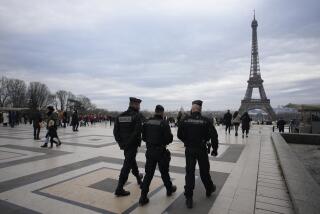U.S., France Examine Lists of Passengers
- Share via
PARIS — French police and FBI agents here are working together to scrutinize passenger lists of U.S.-bound holiday flights after last week’s reported terrorism threats caused authorities to cancel six Air France flights to Los Angeles, a U.S. official said Tuesday.
Armed squads of French air marshals have been aboard selected U.S.-bound flights since early last week because of information that terrorists connected to Al Qaeda were plotting to hijack Paris-L.A. flights and launch attacks similar to the strikes of Sept. 11, 2001, the official said.
“There is enhanced scrutiny and investigation underway in light of the heightened concerns during the holiday period,” the official said, referring to the examination of passenger lists for potential suspects. “The concern is essentially the holiday period. There’s no end date that’s been set, but there’s no intention that it be open-ended.”
The investigation has shifted to passengers who did not show up for two Christmas Eve flights that were canceled, French and U.S. officials said.
U.S. investigators have been especially interested in a Tunisian with a pilot’s license who held a reservation from Paris to Los Angeles but remained in his homeland, the U.S. official said. The pilot has been questioned there, but neither he nor anyone else has been arrested, the official said.
“At this point, it does not appear he was connected to any terrorism plot,” another U.S. official said Tuesday.
Investigators in France and other countries have been tracking down several other no-show passengers, the official said. French police are involved in trying to identify and investigate a small number of passengers, officials said. They did not specify how many.
Both French and U.S. officials acknowledged that there were differences of opinion about the case. In a sign that some French investigators think little evidence has surfaced to support U.S. intelligence about a Sept. 11-style plot, anti-terrorism magistrates in France have not opened a judicial inquiry into the flight cancellations -- a routine first step here in cases of arrests, attacks or suspected plots.
However, the lack of a judicial case has not impeded French security services from working closely with their U.S. counterparts, officials from both countries said.
“The French have been immensely helpful,” said a U.S. investigator in Europe.
Los Angeles-based FBI agents are awaiting more information -- from French investigators and FBI agents recently sent to Paris -- about the identities and whereabouts of suspicious passengers, said Randy Parsons, the FBI’s assistant special agent in charge of counter-terrorism in Los Angeles.
Parsons said the flight cancellations were justified.
“It was not only the volume of chatter but the credibility placed on the sources of information” that prompted the move, he said Monday.
“The answer is we may never know for sure if there was a plot or who was planning it or what was planned,” Parsons said.
The FBI agents added to the case, who number about half a dozen, could be overseas for weeks, officials said. The agents here are handling not just the Air France investigation, but an increased counter-terrorism workload that includes the temporarily intensified screening of U.S.-bound passengers, the U.S. official said. French and U.S. authorities are sharing information about possible suspects and can request additional review of passengers, the official said.
Last week’s flurry of activity surrounding the canceled flights -- from heavily armed police rushing to airports to high-level meetings between French and U.S. authorities -- caused moments of tension between the U.S. and French governments, officials said, but in no way dented the nations’ anti-terrorism partnership, which has survived tensions over Iraq and other issues.
The case illustrates the obstacles faced in confirming intelligence, said a European counter-terrorism investigator who works with French and U.S. authorities. Islamic extremists often talk in code and often indulge in rhetoric and exaggeration, making it hard to determine when intercepted conversations are truly discussions about an imminent attack.
“It seems clear there was good intelligence and that someone specifically mentioned these flights,” the counter-terrorism investigator said. “But these guys [extremists] talk a lot. It’s not always clear what they are really talking about, or how much is serious and how much is just talk.”
France’s deployment of teams of armed undercover marshals on planes last week was unprecedented and came before the U.S. government announced that it would begin requiring foreign countries to assign sky marshals to some flights.
Like France, Mexico quietly placed marshals aboard some U.S.-bound flights before Christmas, in response to intelligence that the Al Qaeda terrorist network had targeted U.S.-bound flights from Mexico, officials there said Tuesday.
Also at the request of the U.S., security at Mexico’s international airports last week was raised to the second-highest level. Aeromexico said it had taken its own additional security measures.
Rotella reported from Paris and Krikorian from Los Angeles. Times Mexico Bureau chief Richard Boudreaux in Mexico City contributed to this report.
More to Read
Sign up for Essential California
The most important California stories and recommendations in your inbox every morning.
You may occasionally receive promotional content from the Los Angeles Times.













